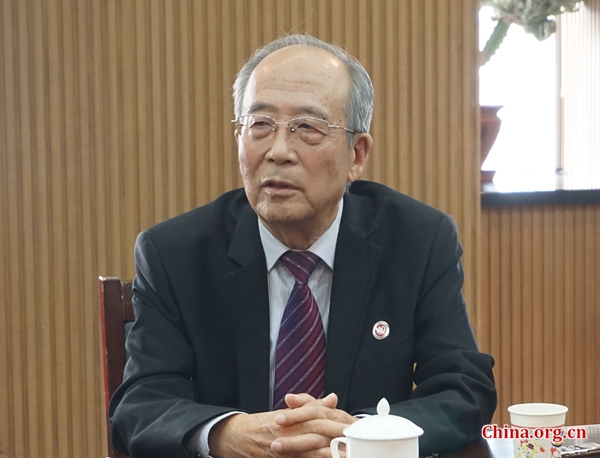A medical professional's lifelong passion for Xinjiang
- By Fan Junmei
 0 Comment(s)
0 Comment(s) Print
Print E-mail China.org.cn, October 11, 2019
E-mail China.org.cn, October 11, 2019

From Beijing to Xinjiang, from a grassroots healthcare worker to a college professor, every major turn in Fu Derun's life bears testament to a patriotic intellectual who willingly responds to his country's call to serve the people.
Still looking hale and hearty and sounding much younger than his age, Fu Derun looks nothing like an 81-year-old.
"I've spent my whole life instructing others how to live a healthy life in the Xinjiang Uygur autonomous region," Fu said. "My time and energy are limited; I can't allow myself to be distracted."
A retired professor from the Public Health College of Xinjiang Medical University, Fu was recognized as one of Xinjiang's leading experts in the popularization of science and a candidate for China's "Most Beautiful Sci-Tech Personnel" of 2019.
A Jiangsu native, Fu spent six years studying preventive medicine in the Peking University Health Science Center. In 1968, he was sent to work in Pishan, a poverty-stricken county in Xinjiang's Hotan prefecture.
About 95% of the population in Pishan are Uyghurs. "I spent three months learning their language and could treat my patients without the help of an interpreter," recalled Fu, whose patients lived at the foot of snow mountains or in the desert. "It used to be rather dusty and hot, and transportation was very inconvenient. My way of getting around was either to ride a donkey, or simply travel on foot," he said, adding that he couldn't remember how many times he had fallen off his donkey but was certain that his ankles were often bruised.
Together with his wife Guo Wei, an alumna in the Peking University Health Science Center, Fu spent 12 years in Pishan county spreading knowledge on epidemic prevention to the local residents.
In 1973, paracholera broke out in the neighboring Kashgar prefecture. To curb its spread, Fu was tasked to send suspected epidemic samples collected in Pishan to Kashgar city for diagnosis and return and report the findings to the relevant departments in Hotan prefecture. Each journey he made was about 800 kilometers.
To save time and avoid being infected, he stored a dozen "nang" and two big bottles of water in his vehicle. Nang, a crusty pancake, is the staple food of the Uygur and Kazakh people in Xinjiang.
Fu made these trips from spring to autumn, over the period between 1973 to 1980. "It turned out to be a journey in weight loss," said Fu, "I lost several pounds annually during those trips."
In 1980, the couple was transferred to Xinjiang Medical University and started 20 years of training professionals and medical staff in nutriology and food hygiene.
They were invited to work in a medical university in central China's Henan province the same year, but they chose to stay. "We had already rooted ourselves in Xinjiang after 12 years of hard struggle," explained Fu, "We had fallen for this place."
Fu has participated in the training of dieticians and nutritionists since 2005. It was estimated that due to his efforts, a total of 5,000 trainees have been certified to help reform people's dietary habits.
Over the past 15 years, Fu has spread the knowledge on nutrition and healthcare among about 160,000 people through over 1,800 lectures.
"It is much harder to popularize science in the community than in the classroom," said Fu, "You have to speak in a way the audience can easily understand." For a single lecture, Fu often has to prepare different versions to ensure kids or the elderly can understand his ideas.
"I'm proud that I'm still useful at this age, and I won't quit till I have to," Fu said. For him, half a century of work is just not enough.






Go to Forum >>0 Comment(s)